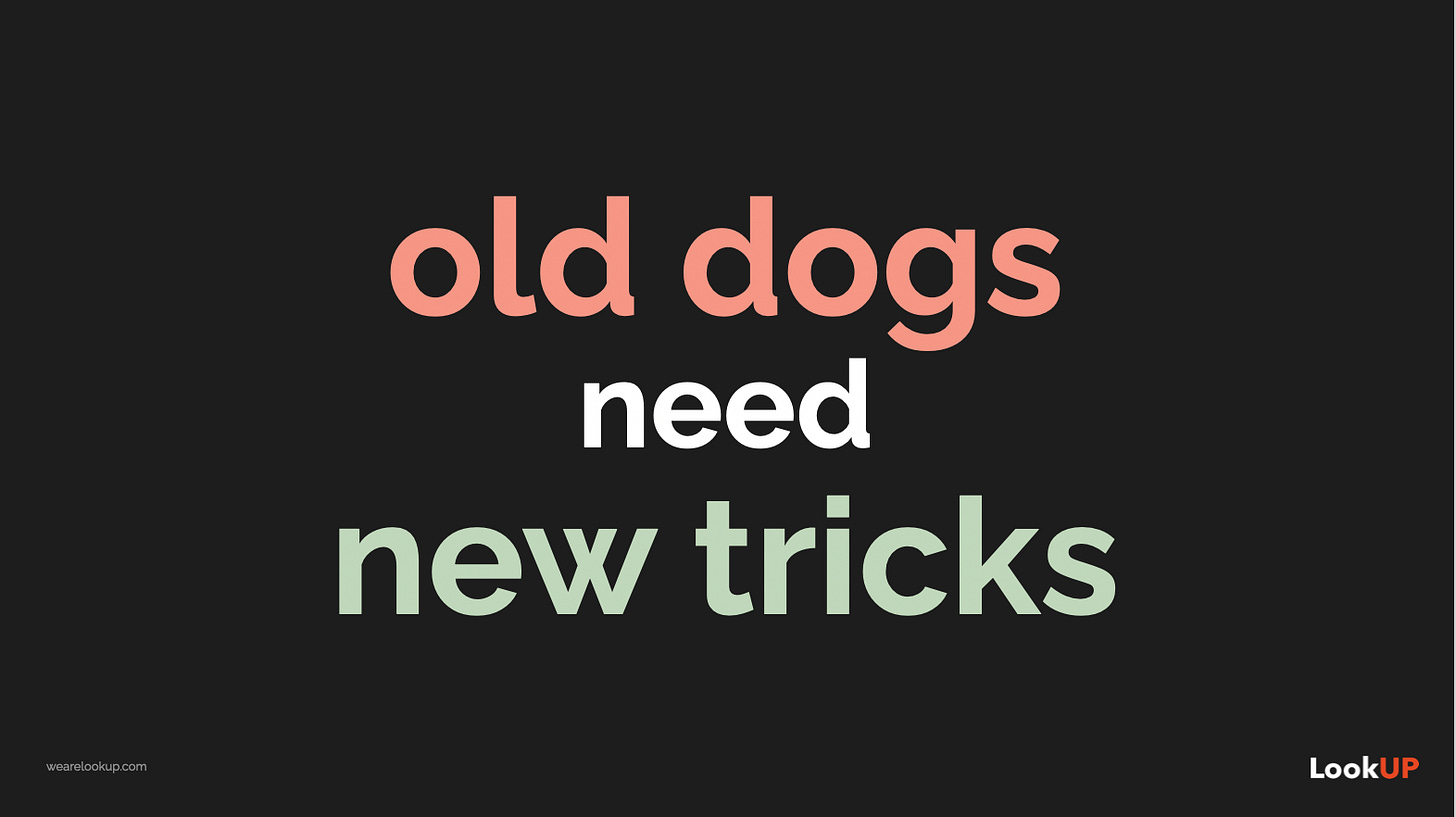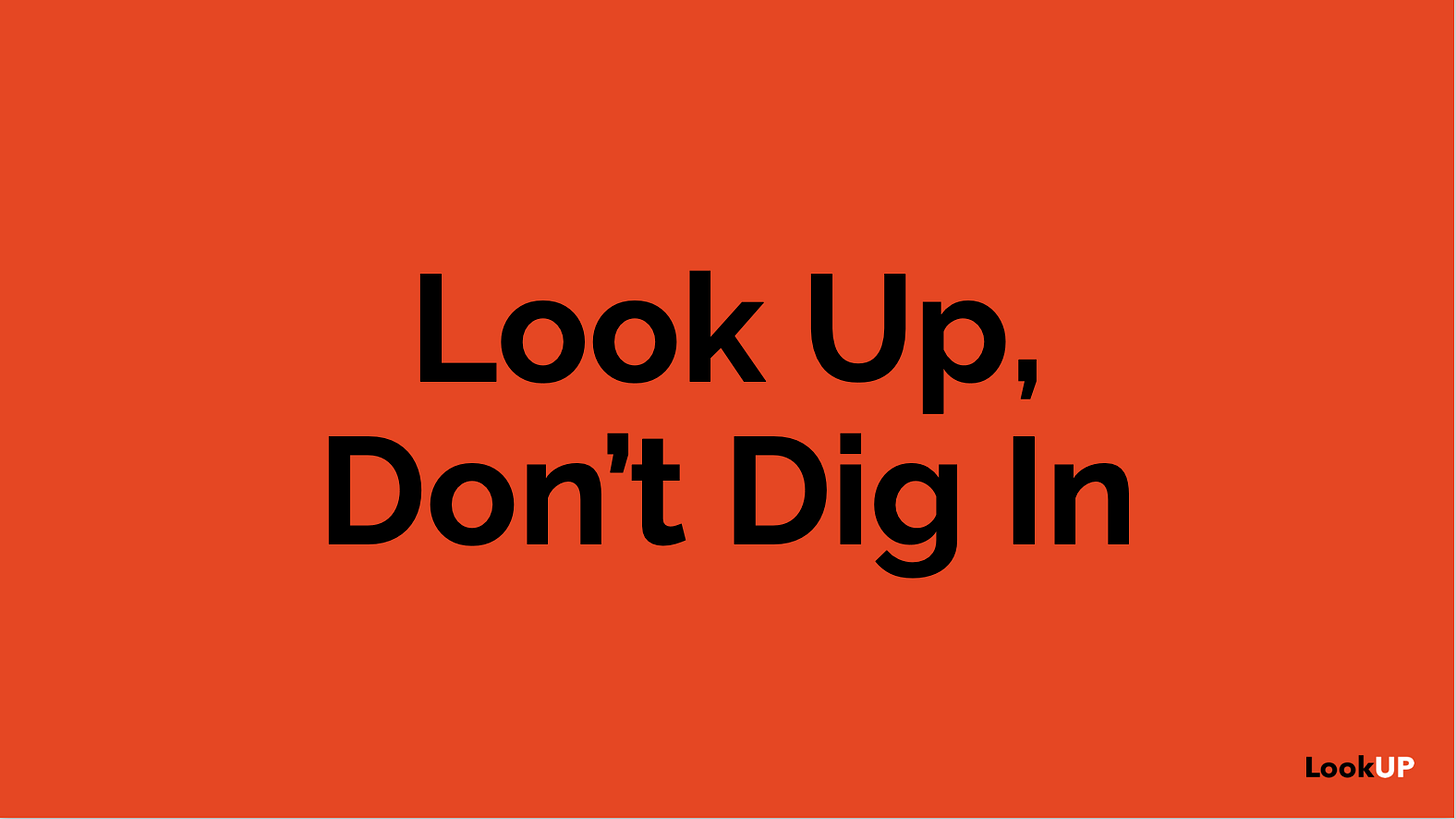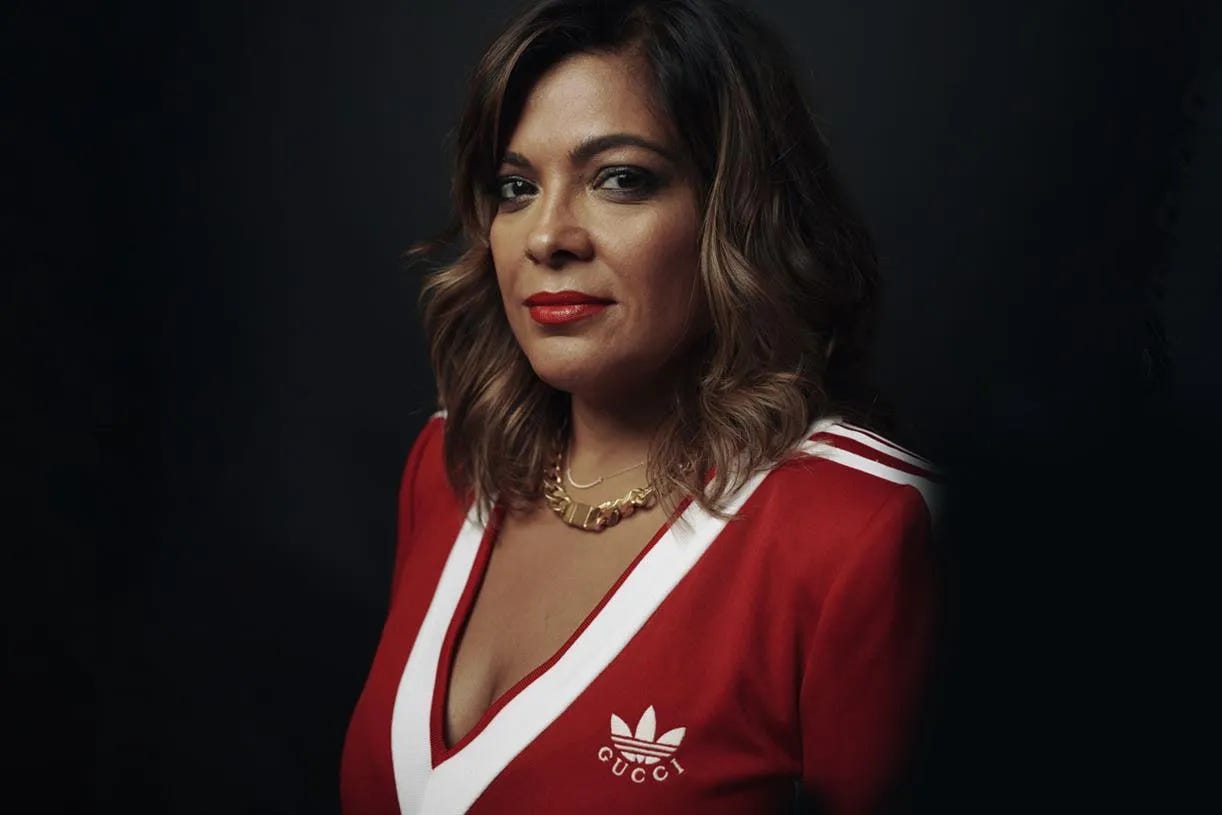Old Dogs need to learn New Tricks
How to get ahead of change in your mid-career
“I have, in my mind, secretly, established genre categories for lyrics I write. They are affectionately titled Quill Lyrics, Fountain Pen Lyrics, and Glitter Gel Pen Lyrics. Frivolous, carefree, bouncy, syncopated perfectly to the beat, Glitter Gel Pen lyrics don’t care if you don’t take them seriously because they don’t take themselves seriously.”
Taylor Swift
At the close of our interview with LookUP Expert, Tracy de Groose, she pointed us towards these words of wisdom from multi-era creative guru (and commercial juggernaut) Taylor Swift. And they had us checking our stationery drawers.
As Taylor Swift’s historically epic Eras Tour hits Europe, it’s worth reflecting on her secret weapon. The ability to think flexibly about her voice, her identity, and her path. And she may only be 35 now, but it’s a good bet that she will still be successful on whatever path she chooses 10 and 20 years from now, because she’s already ahead of that change.
To us mere mortals, all of this can feel quite intimidating, and it can feel harder and harder as we get older. How do we keep reinventing and refreshing ourselves?
I guess the essential thing to remember is that if we want our mid-careers to be the start of a new lease of life, we really don’t have any choice. We have to stay ahead of change. And that means breaking some old habits, and making some new ones.
Working lives are long. By the time we reach the middle, we already feel like we’ve climbed a mountain, and getting ready for another one can feel quite daunting.
But there’s plenty at stake, and a lot to be gained..
On the downside, this is a moment where we see people’s levels of motivation and engagement within their organisations start to drop markedly, as their organisations stop investing in their skills and mindsets. It’s also where we see people facing redundancy, or enforced career path change, without some of the preparation needed (particularly in the contemporary marketing landscape).
But it’s also a time of opportunity.
Within organisations, it’s easy to start feeling the pressure of the next generation coming up behind you - but equally there’s a huge opportunity, to be refreshed and renewed by their ideas. And being in a position to give them the guidance and leadership they need to fulfil their potential, can be thrilling.
Beyond the organisation, it can tempting to feel like the boat has sailed on entrepreneurship, possibly because culture reflects back to us the same stereotype of entrepreneurialism that Open AI spins up (prompt: create an image of someone who has just set up their own business)...
…but this is nonsense! The average age of a new entrepreneur isn’t 20-something, it’s 45. https://hbr.org/2018/07/research-the-average-age-of-a-successful-startup-founder-is-45
If you are responsible for learning in an organisation, perhaps it’s time to reinvest in the potential and flexibility of your mid-career generation?
And if you are in your mid-career, maybe it’s time to re-invest your time and resources in your own flexibility, and your own potential?
From all the conversations we’ve had, there are perhaps three salient pieces of guidance that have landed with us, which we’d like to share with you.
Look up, don’t dig in. We are all in danger of negative self-framing, based on age, and those attitudes will limit us, unless we work to change them.
Find the right focus for you. There are infinite choices, and you can’t learn everything. We’ve chosen three areas for a reason - they might be right for you.
Build a plan, and start to play. We can’t rely on natural momentum, so we need a plan - but the mind learns best when it’s having fun!
This month’s content is addressed at a moment of truth - the mid-career crossroads - and whilst that moment can absolutely hit you at any moment, it’s fair to assume this piece is going to attract a lot of 40-somethings and 50-somethings.
So, we should probably start with a reality and terminology check. The assumptions of previous generations, and the occasional evidence of our creaking bodies, may make us feel like ‘old dogs’, but by any objective, contemporary standard, we absolutely aren’t.
The world is undergoing a demographic revolution unlike anything we’ve seen in human history, aided by improving health and declining birth rates. The bar of relative youth is moving higher and higher. In most highly economically developed nations, 40 isn’t old, it’s the average. We can reasonably expect retirement ages of anything up to 70 or beyond by the time we get there.
And that’s being reflected attitudinally too, in culture, in politics. In the current UK election, we are seeing huge splits between younger and older voters in voting intention…but where does that age split begin? AT 49. (Below 49, only about 8% of people would currently vote for the Conservative Party.
This seismic shift brings jeopardy, and a responsibility.
The jeopardy is a familiar one - how employable do we feel?
Unemployment may be generally low in the world at the moment, but a little closer to home, in the marketing world, things feel a little more volatile. The combination of economic pressure, and the early stage of the rise of AI, are putting efficiency pressure on marketing departments, agencies and tech companies alike.
In this context, the capabilities of the ‘old dogs’ - experience, judgement, range, short cuts, are perhaps more valuable than ever. But the opportunity to apply the same skills, in the same way, in the same context is getting slimmer and slimmer.
On the other hand - the responsibility. Age may feel like a disadvantage in a recruitment beauty parade, but in many, many others, it’s a big advantage. Older dogs often have the power of incumbency, and well-established networks of influence.
In a fear-driven economy, the danger is that we drop into a ‘defensive crouch’ - where just as our capability to make a positive difference is at its peak, behaviours become self-serving, we inhibit innovation, we embed cynicism in the workplace - when what it needs are fresh ideas and flexible mindsets.
Whether your key motivation is to stay ahead of the threat, or to be the most positive force for change possible in the workplace, the core attribute required is the same: neuroplasticity.
The very essence of the phrase ‘Old Dogs can’t learn New Tricks’ is based on an underlying assumption that the brain is less good at processing new ideas as we get older. What’s interesting about this assumption is that on a physiological level, it may be simply untrue. Read more of the science here…
There's some really interesting thinking in this area in a book called 'Gnar Country: growing old, staying rad'. Steven Kotler is a best-selling author who decided to throw himself into Park Ski at an older age. Along the way, he made really interesting in-roads into the science of the brain and body and ageing - found that there are beneficial changes that happen to our brain later in life:
“As we enter our fifties, if we get “it” right, we gain access to a suite of legitimate cognitive superpowers. Over the course of that decade, there are fundamental shifts in how the brain processes information. In simple terms, our ego starts to quiet, and our perspective starts to widen.”
Steve Cutler, Gnar Country: growing old, staying rad
Putting our existing skills to use in new contexts, and combining them with new ones, is one of the key challenges of our mid-careers. It requires a reflective relationship with our capabilities, our motivations, and our work. But as explored in the excellent Range by David Epstein, it’s one of the most essential and valuable things we can do:
“Modern work demands knowledge transfer: the ability to apply knowledge to new situations and different domains. Our most fundamental thought processes have changed to accommodate increasing complexity and the need to derive new patterns rather than rely only on familiar ones. Our conceptual classification schemes provide a scaffolding for connecting knowledge, making it accessible and flexible.”
― David Epstein, Range: Why Generalists Triumph in a Specialized World
Put simply, the broad ground we have covered, and the things we have seen, should be highly valuable in solving new problems and exploring new opportunities. But it requires flexibility, curiosity, and a thirst for learning.
Where do we start?
With the entire body of human learning at our fingertips, perhaps the key question is not whether we can learn new tricks, but which new tricks to learn.
This is a question for everyone to learn on their own terms - and what you are looking for is probably a portfolio of learning activities that break your rut in different ways.
Tom Vanderbilt calls this the ‘Beginner’s Mindset’ - and it is based on an experience in which he spends a year learning new skills (surfing, chess, singing, juggling) because he's 'stuck in a rut of mid-career competence'. Absorption in a new activity is meditative and makes you see the world differently, and build your flexibility.
As LookUP, we predominantly focus on three specific areas of learning, FutureMaking, CommunityBuilding and StoryTelling, because this is where we have expertise, and because we’ve seen how transformational they can be.
Each has a special poignancy in the mid-career moment, and we’d like to make a case for each as a point of focus.
1. Understand what’s coming
For many people in our generation in marketing, we were the people who explained the importance of the Internet to the previous generation - with mixed results! On occasion they were frustratingly misinformed, and no doubt we were sometimes impatient, and smug.
But looking back it was easy to see the old dogs of that generation neatly falling into three camps: the cynical luddites, the glib enthusiasts - and the constructive, curious future builders. I’d imagine most of us would like to be the latter!
It feels like right now we are at several similar turning points:
AI is going to remake the way we absorb and use information
Workplace culture is going through a generational shift
The sustainability of our economic model is under huge pressure
To create positive futures, for ourselves, and our teams, and our families, we have to be invested in understanding and shaping that future, not waiting for it to happen. What do we want our future to be? We proposed a framework for thinking about that on an annual basis here.
And that means recognising that we are not the experts in every area - but we can be curious, open-minded explorers, who are ready and willing to reconsider the fundamentals of what we do, to make them better.
How do we do that? We had this conversation recently with Jo Royce, LookUP Expert and former people and capabilities leader at both Google and Unilever. It was a great conversation that covered a lot of ground, and we look forward to sharing it with you later in the month. But here’s a simple but powerful snapshot of how Jo described her own learning process, when approaching the big new changes emerging in the world:
It starts with curiosity. Real, genuine curiosity. Then I simply just immerse myself in following people whose opinion I trust and respect, and see what they're doing, and what they are reading. And then from there, you definitely need to accept that you need to understand how this will show up, and what impact it may have on you know, and start to properly explore it in a small ‘baby steps’ kind of way. That's it.
2. Build the networks you need
One of the big invisible assets of the mid-career is your personal and professional network. It’s an important part of what sustains and supports your career journey.
But it can hold you back too. It’s often an accidental structure, built on where you’ve been - and if where you want to go is somewhere different, you might need to be more purposeful about your future network.
Nicholas Christakis, pioneer of network theory, has closely examined social contagion, and the effect that our social groups can have on issues as broad as our mood, our worldview, and our health.
The positive side of the equation is also true. If we get a sense of what we want to become, we need to get to know the people who have seen the territory that is just over the hill, to learn what they know with humility and curiosity, and to keep them close.
That means active, planned network building. It means thinking about the areas where we have blind spots, and seeking to build networks which are multi-generational, diverse in backgrounds and world views, cross into the skill-sets we don’t understand, and give us access to the perspectives we haven’t always agreed with.
And that means proactively thinking about the value that our experience can bring to those communities, not just what we want to learn or take from them. It means actively seeking the social contagion we need to thrive - even when it may take us out of our comfort zones. As LookUP Expert Nishma Robb described in our interview last month…
I just learned that I had this bubble that had been built by algorithms and my own comfort zones, that was really unhealthy. And now I love stepping out of it and meeting people or things that I wrinkle my nose at and go, never go. ‘Not for me’ is the thing I’ll go and make myself do.
3. Be the Director of your own story
By mid-life, we have a lot of biography, and that can muffle our ability to explain who we are, and what we can and want to do, with effective clarity.
But there are likely to be things in your backstory that are of the highest interest and value to others. By mid-life, we need to be expert at understanding our own story, and selecting effectively to help people understand why our skills and our knowledge are applicable in a new situation.
Mark Leruste expressed this brilliantly in our interview with him in the Spring:
To know what stories are relevant, we need to first understand what stories we have. So that's like cool mapping out your story bank. Because once you start mapping out your story bank, you can see that you've got stories, for example, oh, stories of how I overcame, like massive adversity at work, or you know how I was part of a project or, or like, whatever that is, you can start mapping out and start labelling them into different categories.
We’ve explored this in detail before, so if you haven’t seen this yet, I strongly recommend our Be the Director rabbit hole.
It’s particularly relevant for mid-career, and is what we will be exploring at our events this month for people who have recently been made redundant.
Our next piece will dig a little deeper into some of the tricks and techniques that we’ve learnt from our interviews with LookUP Experts over the last few months.
We’ll give a snapshot of some of the approaches they use to reframe and refresh their own worldviews, networks, stories, and working practices. (And we will give you a ‘Stay Ahead Plan’ to play with, that might help you to get started.)
But if there is one key principle that we would embody, it would be the power of purposeful play as the key to learning new tricks.
It’s a principle that underpins our LookUP Sessions, and a key reason why they consistently get good feedback and achieve good outcomes that stick.
You can look at play as a form of self-experimentation, in which you are using experiments with new experiences to reframe your idea of what is rational, as pioneered by William Ellis when he developed Rational-Emotive-Behavior-Therapy (REBT).
But perhaps there’s a simpler way to think about it - if you want to learn, and change your worldview in constructive wats, remember to have fun.
“Far from being frivolous or selfish, the pursuit of fun will help us achieve all of these goals. Life is not a zero-sum equation: we can care about fun and be conscientious citizens who are committed to improving the world—indeed, fun can give us more energy with which to do so. And if we want our own lives to be satisfying and joyful, True Fun isn’t optional. It shouldn’t be an afterthought. It should be our guiding star.”
― Catherine Price, The Power of Fun: How to Feel Alive Again
Available now at Mr Bingo’s Online Supermarket
The mid-career moment offers new threats. Stagnation, unwanted redundancy, loss of direction. But you can also see it as big new opportunity - to become the leaders or practitioners you wanted to be, or to start new ventures that fulfil your hidden ambitions.
None of those journeys are easy, but the more flexible we are, and the more we get ahead of change rather than waiting for it to happen to us, the more freedom we have.
We all need New Tricks. We hope you enjoy finding yours. If you’ve found something that you love, we’d love to hear about it in the comments!
Still to come this month…
Tips and tricks from our LookUP Experts to become effective lifelong learners
Some of the key learnings from our LookUP post-redundancy Personal Brand event
Our LookUP List, packed with great summer reads and areas to explore














